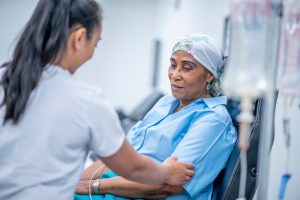
Myths and Reality of Chemotherapy Side Effects
Patients with cancer understandably may be apprehensive about chemotherapy because of its association with significant side effects. While it is true that some patients do
HIPAA Alert: Potential Data Breach Learn More
Questions on Oncology, Hematology and/or Infusion Clinical Services due to COVID-19 Crisis – CALL 833-698-1623
Important Information for Our Patients Regarding the Coronavirus.
RCCA Providing Area Cancer Patients with Access to Care During Coronavirus Outbreak
RCCA Offering Patients Virtual Visits During Coronavirus Pandemic
As with most cancers, early detection plays an important role in the treatment of lung cancer. Knowledge of lung cancer symptoms increases the possibility of detecting the disease in its earlier stages, and this can impact the range of treatments available and the outcomes that can be achieved.
Lung cancer develops because of mutations and changes occurring in the cells of the lungs, with affected cells growing at a faster rate than normal lung tissue. People who notice lung cancer symptoms should contact a physician as soon as possible. Cancer care experts are available at Regional Cancer Care Associates, which has 25 convenient locations in New Jersey, Connecticut, Maryland and the Washington, D.C., area.

Unfortunately, the signs of lung cancer aren’t always noticeable in the early stages of the disease, and symptoms can be mild at that point. Lung cancer symptoms may include:
Other lung cancer symptoms may arise after cancer has spread in the body.
Some lung cancers are detected following the development distinctive syndromes, such as:
Many lung cancer symptoms, such as cough or hoarseness, may be due to other causes. It is important that people experiencing any symptom of potential lung cancer see a physician promptly for evaluation. This is particularly true for people who have risk factors for lung cancer, which include:
Patients diagnosed with lung cancer today have more treatment options than ever before. Those options include immunotherapy, targeted therapies, surgery, chemotherapy, and radiation therapy, with a patient typically receiving a combination of those treatments over time. The expert medical oncologists of RCCA carefully consider each patient’s case in developing a comprehensive approach designed to obtain the best possible outcome.
Patients who note lung cancer symptoms should make an appointment with their healthcare professional without delay. Early detection and diagnosis mean more options for the effective treatment of lung cancer. At Regional Cancer Care Associates, our medical oncologists and clinical staff members offer expert, compassionate care to patients with lung cancer or other cancers or blood disorders. Our specialists practice at 25 conveniently located care centers throughout New Jersey, Connecticut, Maryland and the Washington, D.C., area. Make an appointment at a Regional Cancer Care Associates location today.
If you or a loved one is battling non-Hodgkin lymphoma, you aren’t alone. Our experts at Regional Cancer Care Associates are dedicated to delivering accurate diagnoses and effective treatments. To find out more or make an appointment, get in touch with us at one of our locations throughout Connecticut, Maryland, and New Jersey.

Patients with cancer understandably may be apprehensive about chemotherapy because of its association with significant side effects. While it is true that some patients do

Like many people, Avishek Kumar, MD, scheduled some time away from the office this summer. However, his version of an “island get-away” was hardly the norm.

Just like blue eyes and heart disease might run in your family, cancer can, too. However, only about 5- 10% of all cancers can be

Regional Cancer Care Associates is one of fewer than 200 medical practices in the country selected to participate in the Oncology Care Model (OCM); a recent Medicare initiative aimed at improving care coordination and access to and quality of care for Medicare beneficiaries undergoing chemotherapy treatment.